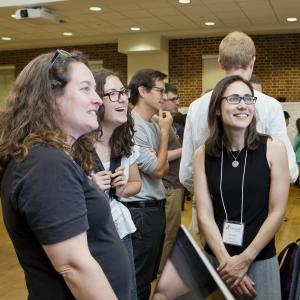Mission and Values
The mission of the Language Science Center is to advance an interdisciplinary science of language to address large-scale, complex problems in fundamental science and society.
We aim to:
- Raise the profile of language as a critical research area - locally, nationally and internationally
- Build connections between researchers, disciplines and institutions
- Enable language scientists to address important questions in new ways
- Improve awareness and public understanding of language issues and the need for language-related policy decisions to be scientifically informed
- Increase the visibility of individuals’ and departments’ contributions to language science and to the University of Maryland
COMMUNITY GUIDELINES
This is a community where everyone has something to learn from everyone else, both faculty and students. You’ll encounter concepts, theoretical frameworks, and research approaches that are very different from what you’re familiar with. What is unfamiliar might seem incomprehensible or even incorrect. Please keep the following guidelines in mind when interacting with other students and faculty, especially those who are different from you in their academic or personal background:
- Don’t assume that someone shares your assumptions or jargon: ask questions to find out.
- Approach conversations with humility: while you may know more about some things, chances are they know more about something else.
- Invite people to teach you about what they know, rather than merely providing critiques based on your perspective.
- Keep your relative power in mind (whether based on your personal identity or your position in the university hierarchy), and use it to support people rather than put them down.
- Introduce yourself and provide context (e.g. department, pronouns) when you’re giving a talk, asking a question, or meeting someone new.
- Respect any requests or boundaries set by the person you’re interacting with.
- Follow any guidelines set by a presenter about questions during their talk.
- Give them the kind of feedback they ask for (not necessarily the kind you think is most important).
- Use their requested pronouns.
Our approach incorporates key lessons that we have learned about how to create and sustain a vibrant and diverse research community.
Thinking Beyond Disciplines
Collaborative research, teaching and training are the foundation of our approach, and we work to create and support strong connections between language scientists across the university.
Leadership Across the Community
We encourage all members of our community to take on leadership roles. This diversity of leadership adds creativity, and creates a broad sense of shared ownership of the community and its achievements.
Long-Term Outlook
It takes time to build trust, develop a shared vision, and build effective relationships. We are investing in our community for the long term.
Trust in Young Talent
Our students devise their own interdisciplinary training plans and take on key leadership roles in language science initiatives. We regard this as an essential part of their training. It has also been essential in building strong links between faculty and departments.
Science is Social
Our research and training are strengthened by opportunities to talk, interact, get feedback, and build connections both within and outside of traditional academic contexts. We do better science with people who we trust, and who are comfortable giving us candid feedback.
Outreach
All faculty and student members of the Language Science Center participate in outreach activities. This makes us better communicators, better collaborators and better scientists, while raising visibility and public understanding of language science.
Measuring Progress
By setting clear, attainable goals and evaluating our progress, we keep learning how to improve on what we do. Formative assessment, when done right, can really make a difference.








